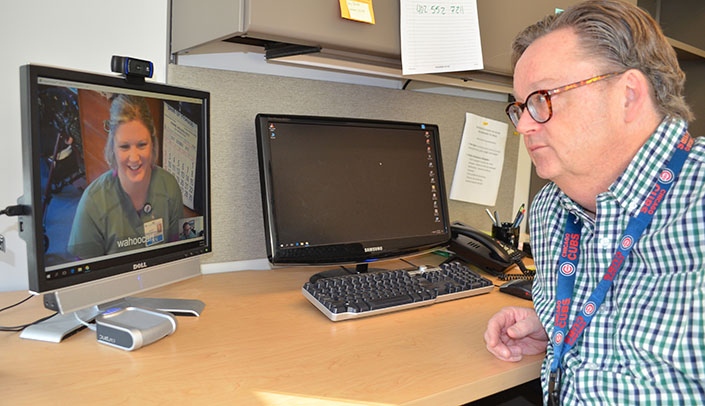As one of only five geriatric psychiatrists in the state of Nebraska, Tom Magnuson, M.D.’s, unique set of skills is more than welcome at the 80 nursing homes to which he provides service.
In fact, one nursing home director considers the UNMC associate professor a “godsend.”
“We just don’t have services like this around here, so for Dr. Magnuson to be able to provide his expertise to not only our patients but staff is phenomenal,” said registered nurse Pam McDonald, director of nursing at the Oglala Sioux Lakota Nursing Home, a 60-bed facility on the outskirts of Whiteclay, Neb.
Eydie Schrad, director of nursing at Cloverlodge Care Center, a 47-bed facility in St. Edward, Neb., said Dr. Magnuson’s geriatric tele-psychiatry services have saved sending residents two hours or more to other facilities to receive care.
“Other than phone calls or faxes, the residents who needed this type of care, weren’t being seen,” Schrad said.
That all changed in 2004 when Dr. Magnuson began providing geriatric psychiatry services via a secure telehealth platform.
Dr. Magnuson is able to routinely connect with patients, their families and health care professionals on a weekly basis and averages more than 450 visits a year.
“The level of care a person receives should not depend on geography,” Dr. Magnuson said.
Cloverlodge was the first nursing home he provided service to through the telehealth connection in 2004; the Oglala Lakota Sioux Nursing Home came onboard in 2016.
Dr. Magnuson said he will see as many residents per facility as necessary to as few as one patient. He also provides support and counseling for families of patients if they have questions, as well as continuing education for staff.
As a geriatric psychiatrist, Dr. Magnuson specializes in the biological and psychological aspects of normal aging, as well as the psychiatric effect of acute and chronic physical illness.
His focus is on the prevention, evaluation, diagnosis and treatment of mental and emotional disorders in the elderly and improvement of psychiatric care for healthy and ill elderly patients.
And for the past 14 years he has shared his unique expertise with nursing home residents, caregivers and health care professionals across the state.
“The patients are older, more fragile and you have to pay attention to the different kind of needs each individual has,” Dr. Magnuson said.
Sometimes their behaviors are expressed through agitation either vocally, like crying out or yelling, or physically that can involve hitting or throwing items, all of which is disruptive and can be unsafe, or interfere with the delivery of care, he said.
Many times their behaviors are the result of a physical ailment, dementia or disease and can be managed through medication or non-medical interventions, Dr. Magnuson said.
McDonald said that in the nearly two years Dr. Magnuson has provided service to the residents there, she has seen a decrease in belligerent behavior.
“There is less yelling and cursing in the dining room and the staff is able to talk with residents to calm them,” McDonald said.
Another bonus of having access to the expertise of a geriatric psychiatrist, she said, is the decreased use of medications.
Dr. Magnuson, McDonald said, knows what the best medications are for those patients who have dementia, as well as the best dosage, which is often less than previously prescribed, and that is leading to more engaged, alert patients.
“We have patients who were too lethargic to walk because of their medications and now they are walking,” McDonald said.

Tom Magnuson, M.D., at right, speaks with a colleague through telecommunication.
